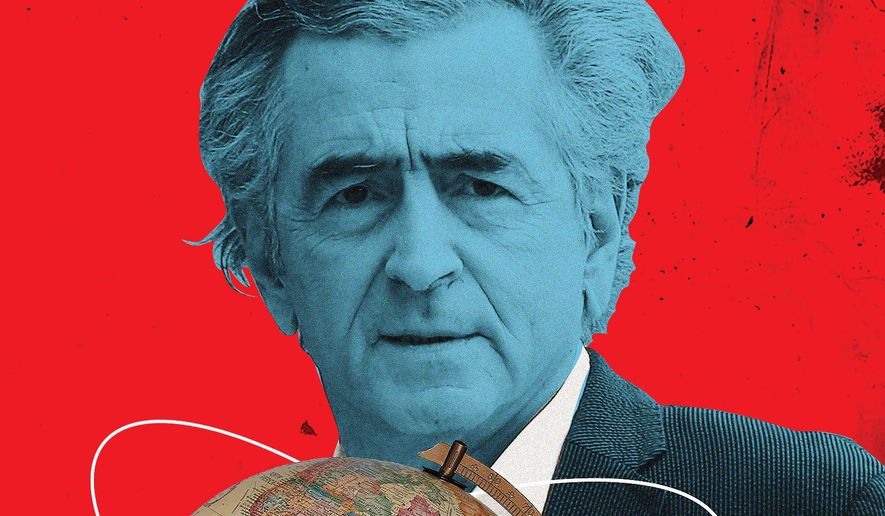OPINION:
Bernard-Henri Lévy is a philosopher, author, filmmaker, reporter, and bon vivant. Born in Algeria, the scion of a wealthy family (he owns a palace in Marrakech), he is French, Jewish, atheist, and a self-described “Baudelairean.” (I don’t know what that means either.)
His hair is graying but not yet gray, insouciantly long in the back. His suits are bespoke. His crisp white shirts have mandarin collars, with a few buttons left unbuttoned. At 72, he is slim and fit, as peripatetic and intrepid as ever.
In France, he is often referred to simply as BHL, and that’s what I’ll call him here since “Mr. Lévy” just doesn’t sound right. That he is something of a self-promoter goes without saying, though I’m saying it anyway.
But we should give credit where credit is due: BHL uses his extravagantly cultivated celebrity to bring attention to people and places in severe distress yet ignored by major media and assisted incompetently – if at all – by the politicians and bureaucrats we insist upon calling “the international community.”
Just before and even during the global pandemic, he visited eight such “hotspots,” witnessing atrocities and tragedies, and speaking with those suffering and, in many instances, dying.
He has a new book and film based on his journeys: “The Will to See: Dispatches from a World of Misery and Hope.” In them, he is admirably unconcerned with the demands of the “politically correct” mobs.
For example, he has a chapter titled, “Nigeria’s Christians Are Under Siege!” In the 1980s, I spent a fair amount of time as a foreign correspondent in Nigeria, Africa’s most populous country, with its largest economy.
There were ethnic and religious divisions back then, but a jihad was not being waged. What’s taking place now, BHL writes, “is a massacre of Christians on a scale that appears to exceed even what the Christians of the Middle East have undergone.”
This slaughter, he makes clear, is being carried out primarily by the Fulani, once known as pastoral nomads of the Sahel: “The Fulani storm in on their long-saddle motorcycles, three to a bike, shouting, ‘Allahu Akbar.’ They torch houses…before the villagers can take shelter or flee, the Fulani are upon them, in their houses, swinging their machetes, chasing cries in the night, seeking out pregnant women, burning, pillaging, raping.
“They do not always kill everyone. At a given moment they stop. They recite a verse from the Koran…Survivors are needed to tell the tale, to spread fear from village to village, to bear witness that the Fulani, fearing nothing but Allah, are capable of anything.”
He notes that “radical mosques” are “springing up as fast as the churches burn down.” Behind the violence, he sees the hand of Boko Haram, the terrorist group that savagely preys on “all of the unbelievers, Christians and Muslims alike, of Nigeria, Chad, Niger, Cameroon and beyond.”
Attempts to defeat Boko Haram have been unavailing. “It’s hardly surprising,” a Nigerian attorney tells BHL. “The high command of the Nigerian army is Fulani. The whole administration is Fulani.” He adds that President Muhammadu Buhari, “who depends on subsidies from Ankara and Qatar, is a Fulani.”
During a discussion at the Hudson Institute last week, BHL adds that the Nigerian government has been “poisoned by Islamism.”
His chapter on Afghanistan is based on a visit he made to that devastated land in August of 2020. President Trump had concluded a withdrawal agreement with the Taliban who continued, nonetheless, to murder Afghans regarded as insufficiently submissive. At Hudson, BHL calls President Biden’s chaotic and bloody retreat last August, a “catastrophe.”
He indicates that the leaders of France, Germany, and Britain foresaw that a precipitous withdrawal would be tantamount to surrendering to the Taliban and its ally, al Qaeda. I ask him: Why didn’t those leaders make a serious effort to persuade Mr. Biden to reconsider, to pause, to consult with them before bugging out? He doesn’t have a good answer.
In his chapter on Somalia, BHL highlights the nefarious role being played by the Turks. They have a “spanking-new embassy – standing, not leveled; plus a colossal military base from which they never emerge; Recep Tayyip Erdogan’s name is plastered in roman and Arabic characters all along the main arteries.” BHL is struck by the Turkish government’s “complacency toward al-Shabaab fundamentalism, which is not far from the ideology of the Muslim Brotherhood.”
BHL’s other chapters recount visits to Iraqi and Syrian Kurdistan, where an imprisoned Islamic State terrorist “shouts at me in his northern French accent, ‘We know who you are!’”; Ukraine, where he embedded with special forces fighting pro-Russian separatists; Bangladesh where he was honored as “veteran Lévy” for his activism in their liberation movement of the 1970s; Lesbos where he met with refugees determined to resettle in Europe; and Libya, where he is attacked by “armed men in sand-colored uniforms, accompanied by jeering civilians armed with Kalashnikovs, who begin firing and shouting ‘Jewish dog!’” In all these dispatches, I find more misery than hope.
There also is a section titled, “My Creed,” which includes a chapter titled: “The Adventurer: A Self-Portrait,” in which he declares that he never sets out “on a reporting trip without the firm intention of intervening in what I see and changing what I show.” In his Epilogue, he writes: “Often when I leave on a reporting trip my children and others close to me worry. ‘Aren’t you afraid?’ they ask.” But he firmly believes “that if risks there be, they are noble risks that must be taken.”
Did I mention that BHL is something of a self-promoter? Still, he’s telling stories that need to be told.
• Clifford D. May is founder and president of the Foundation for Defense of Democracies (FDD) and a columnist for the Washington Times.




Please read our comment policy before commenting.